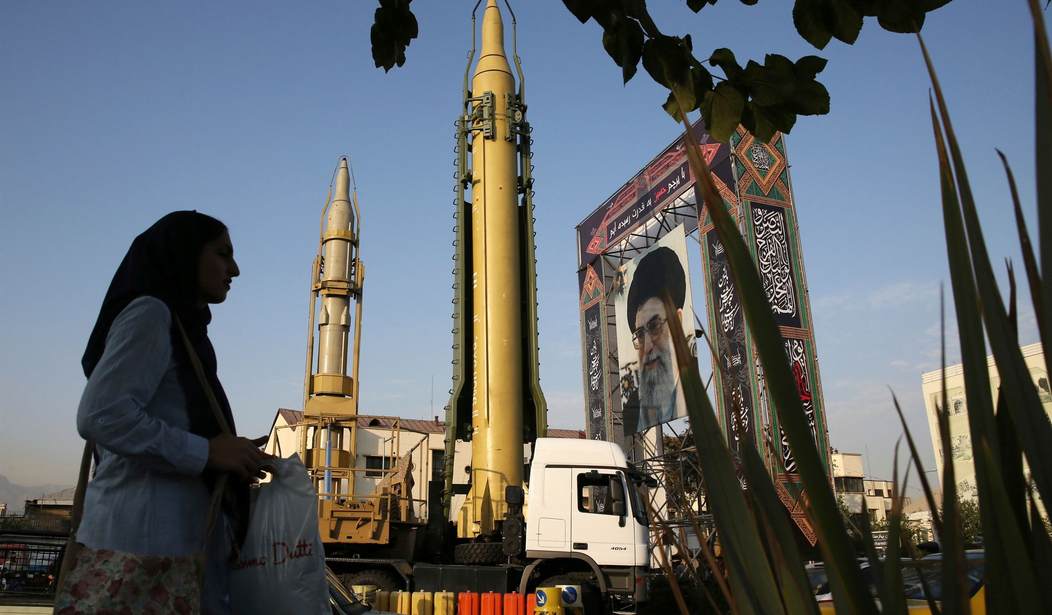The idiom "the elephant in the room," as most of us already know, refers to a big, weighty, and yet uncomfortable topic. Nobody in the room wants to talk about it, but they can't pretend it's not there. It's big, it's unwieldy, and it probably shouldn't be in that room to begin with — what's more, it's clumsy, noisy, and it stinks.
Nobody wants to admit the thing is even there, as such an admission would mean having to admit, discuss, and deal with some uncomfortable truths.
In geopolitics and global military matters, there are a lot of elephants in a lot of rooms, but my colleague Bob Hoge brought up one of the biggest elephants only earlier Tuesday, highlighting some information on Iran and their progress towards developing a nuclear weapon.
Previously on RedState: How Close Is Iran to Getting Nuclear Weapons? New Info Alarms Intelligence Officials.
Bob writes:
New intelligence concerning Iran’s nuclear program has intelligence officials worried that the Islamic Republic is closer to getting nuclear weapons than they had previously thought. Officials are focusing on computer modeling, according to Axios:
U.S. and Israeli intelligence agencies are looking into new information about computer modeling by Iranian scientists that could be used for research and development of nuclear weapons, two U.S. officials plus one current and one former Israeli official told Axios.
Why it matters: The purpose of the modeling is unclear. Some U.S. and Israeli officials said the intelligence is a worrying signal about Iran's nuclear weapons ambitions, but other officials on both sides said it as a "blip" that doesn't represent a shift in Iran's policy and strategy towards weaponization. Iran has repeatedly denied wanting nuclear weapons.
They are, of course, lying about not wanting nuclear weapons.
A nuclear Iran is a chilling notion, but it brings up a discussion that world leaders had damn well better be having with their geopolitical advisors and their top military people: What would a nuclear Iran look like? What would they do, given this capability? And how do we stop them?
Iran is the elephant in this room, and the room is the entire planet. Iran is the world's #1 state sponsor of Islamic terrorism; this has been known for decades, and yet the West just keeps pinging Iran and its proxies around the peripheries.
See Related: US Navy Finally Takes Action in Yemen Against Houthis, Destroying Their Radar Capabilities
WATCH: Netanyahu Releases Video Hitting the Biden Administration, Libs Get Big Mad in Response
There are a couple of things to consider here.
First: It's unlikely Iran, should they achieve a nuclear weapon, would use it. Now, let me qualify that statement: It's unlikely, but not as much so as Russia, China, Israel, the U.S., or even North Korea. I'd put the odds (and this is just me brain-balling it) at one in four — which is high enough to be truly alarming, especially when one considers how unstable Iran's leadership is and has been.
Second: Part of the development of a nuclear weapon includes weaponizing it — in most cases, making it small enough, light enough, and resistant to G-forces to the point where it can be stuck on the front of a missile, fired off, and still work. That's what Iran would have to do, as the odds of them loading such a weapon in any of their rather outdated combat aircraft and flying it anywhere aren't good. But here's the catch: They don't have to weaponize a nuke to use it. The nuke can be the size of a cargo container, as long as it works; all that would be required would be to load it onto some battered old tramp freighter with a skeleton crew, sail it into a harbor late on some night, and torch off the nuke. Say, Haifa — or New York. Or both.
Oh, the devastation delivered upon Iran in return would be catastrophic. Israel has nukes already; they also have at least five diesel-electric attack submarines (ironically all German-built) that some experts think may have been retrofitted to fire nuclear-tipped cruise missiles. As for any American response, well, that depends on who is seated at the Resolute Desk at the moment. Still, the likelihood of such a response may not deter Iran. The old Cold War doctrine of mutually assured destruction (MAD) may not carry as much water with Iran as it does with Russia or China, as Iran's leaders are, not to put too fine a point on it, stark raving nuts; they ascribe to a branch of Shi'a that favors apocalyptic destruction as it will bring about the return of a person known as the 12th Imam, assuring Islamic ascendency.
As for how we stop them? At this point, that would take a major war, which may well explode into a global conflict. Ensuring the destruction of Iran's nuclear capacity would require sending men with rifles in to make sure the facilities were all wrecked, and Iran is blessed geographically by having an ocean on one side and mountains on the other; for any invading force, it would be a tough nut to crack. Losses among the invaders would be very, very bad. Much of Iran isn't really great country for armor or mobile warfare, which is doctrine for most of the developed world's military forces now.
The last nuke torched off in wartime was over Nagasaki in August of 1945, but it was only the last so far. There will, inevitably, be another. And it almost certainly won’t be an American nuke. The question is this: What will our response be when that drastic event happens? If the current president is still in office, it will almost certainly be anemic and ineffective. That will be a response that invites more aggression, not less. If we can learn anything from history, we can learn that.















